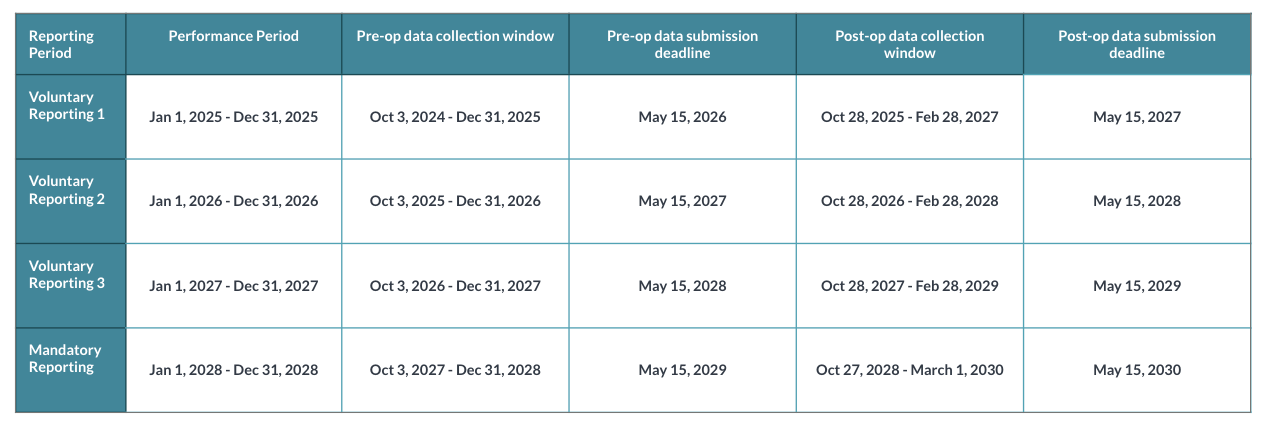The Centers for Medicare & Medicaid Services (CMS) is advancing its commitment to value-based care through the Total Hip Arthroplasty/Total Knee Arthroplasty Patient-Reported Outcome-Based Performance Measure (THA/TKA PRO-PM). This national quality measure standardizes how hospitals, health systems, and ambulatory surgery centers (ASCs) evaluate patient recovery following total joint replacements.
The CMS THA/TKA PRO-PM marks an important shift in how surgical success is measured, emphasizing patient-reported outcome measures (PROMs) over administrative or claims-based data. For hospitals, this measure represents both a compliance mandate and an opportunity to strengthen longitudinal care, improve data quality, and elevate patient engagement.
Why Is CMS Implementing the THA/TKA PRO-PM?
The CMS THA/TKA PRO-PM is being implemented by CMS to assess functional improvement one year after a primary total hip or total knee arthroplasty. Instead of relying solely on clinical metrics, CMS requires facilities to collect standardized PROMs data directly from patients.
The measure aims to:
- Quantify patients’ perceived improvement in pain and mobility following surgery
- Promote shared decision-making between providers and patients
- Encourage consistent, data-driven quality reporting across inpatient, outpatient, and ASC settings
Originally introduced in the Hospital Inpatient Quality Reporting (IQR) program in 2022, the measure was expanded to the Hospital Outpatient Quality Reporting (OQR) and Ambulatory Surgical Center Quality Reporting (ASCQR) programs in 2023. In 2024, the THA/TKA PRO-PM was included in CMS’s Transforming Episode Accountability Model (TEAM), reinforcing its role in the CMS drive to transition the national healthcare system toward accountable value-based care.
Who is Included in the CMS THA/TKA PRO-PM Cohort?
CMS specifies strict inclusion and exclusion criteria to ensure the THA/TKA PRO-PM applies to appropriate patient populations.
Inclusion criteria:
- Elective primary THA or TKA (including bilateral procedures)
- Enrollment in Medicare Fee-for-Service (Parts A and B) for 12 months prior to admission
- Age 65 or older
- Discharged alive
Exclusion criteria:
- Revision or partial joint replacements
- Fracture cases
- Malignant neoplasms
- Procedures stopped before completion
- Discharge against medical advice
These criteria standardize reporting populations across hospitals and ASCs, allowing CMS to make fair, comparable assessments of national surgical quality.
What PROMs and Data Elements Does CMS Require?
To comply with the THA/TKA PRO-PM, hospitals and ASCs must collect and submit both pre-operative and one-year post-operative PROMs data for eligible patients.
Core PROMs Instruments:
- HOOS JR. (Hip Disability and Osteoarthritis Outcome Score – Joint Replacement) for total hip arthroplasty
- KOOS JR. (Knee Injury and Osteoarthritis Outcome Score – Joint Replacement) for total knee arthroplasty
Risk and Matching Variables:
CMS requires several supporting data elements for accurate matching, analysis, and risk adjustment, including:
- PROMIS Global or VR-12 mental health subscale items
- Health literacy via the Single-Item Literacy Screen (SILS)
- BMI or weight/height
- Chronic narcotic use (>90 days)
- Non-operative joint pain and spinal pain measures
- Administrative identifiers such as Medicare provider number, beneficiary ID, date of procedure, and date of admission
Pre-operative data must be collected within 90 days before surgery, and post-operative PROMs must be collected between 300 and 425 days after surgery.
How Does CMS Calculate THA/TKA PRO-PM Outcomes?
CMS measures improvement at both the patient and facility levels:
- Patient-level outcome: Whether the patient achieved Substantial Clinical Benefit (SCB), defined as an improvement of ≥22 points on the HOOS JR. or ≥20 points on the KOOS JR. at one year post-op.
- Facility-level outcome: The percentage of eligible patients who meet or exceed SCB.
Currently, for hospitals not mandated to participate in TEAM, THA/TKA PRO-PM performance scores do not impact reimbursement amounts. However, failure to report required data will result in financial penalties tied to the Medicare Annual Payment Update (APU) in subsequent years.
What are the CMS THA/TKA PRO-PM Reporting Timelines?
CMS is implementing the measure through phased voluntary and mandatory reporting periods.
For Hospital Inpatient Settings:

For Hospital Outpatient Departments and ASCs:

What Happens if CMS THA/TKA PRO-PM Requirements Aren’t Met?
CMS applies pay-for-reporting penalties, not pay-for-performance penalties. The focus is on data submission compliance rather than outcomes. Facilities that fail to report the required percentage of matched pre- and post-op PROMs and other data elements will see reductions in their annual payment update from CMS, as shown below. Notably, this reduction will apply to the entirety of a hospital’s Medicare APU, not just the portion emanating from hip and knee replacements.

What Makes THA/TKA PRO-PM Compliance Challenging for Hospitals?
Hospitals that participated in voluntary reporting cycles identified several recurring operational challenges:
- Sustaining Patient Engagement at One Year Post-Op
- Challenge: Collecting post-op PROMs one year after surgery is difficult without continuous patient engagement. Patients often disengage after their acute recovery phase, leading to lower follow-up rates.
- Solution: Leverage a digital engagement platform that automates reminders, provides ongoing education, and maintains connection throughout the recovery period to ensure 1Y targets are met.
- Time-Intensive Data Management
- Challenge: Manual PROMs collection and formatting create administrative burden and increase risk of error.
- Solution: Automate PROM collection and data formatting through interoperable technology that can transmit structured data directly to CMS’s Hospital Quality Reporting (HQR) system, which is to be used by both Hospitals and ASCs for data reporting.
- Staff Burdens and Lack of Capacity
- Challenge: Without thoughtful automation, hospitals often divert staff from clinical work to manage reporting compliance. This pulls providers away from patient care and cuts the time that care teams have available to dedicate to direct patient interactions, potentially risking patient satisfaction and safety.
- Solution: Adopt a workflow-optimized digital tool that integrates with existing EHR systems, reduces redundancy, and frees care teams to focus on patient care.
How Can Hospitals and ASCs Prepare for CMS THA/TKA PRO-PM Compliance?
Preparation should begin well before the mandatory period. Leading organizations have taken or are taking the following steps:
- Start with Voluntary Reporting: Use the early periods to establish infrastructure and test data submissions before penalties apply.
- Audit Current PROMs Collection: Assess capture rates and identify workflow gaps across pre-op, post-op, and one-year follow-up stages.
- Engage a Qualified Technology Partner: Select a vendor with a proven track record in PROMs collection and compliance support. In particular, ensure that your vendor has comprehensive understanding of the specific requirements of the THA/TKA PRO-PM.
- Automate Matching and Submission: Ensure pre- and post-op data are linked at the patient level and formatted correctly for CMS submission.
- Monitor and Report Internally: Regularly review PROMs completion rates and automate reporting dashboards to stay on track.
Facilities that prepare early will not only avoid penalties but also strengthen the infrastructure required for future value-based models like TEAM.
Why Does the CMS THA/TKA PRO-PM Matter for Surgical Care?
The THA/TKA PRO-PM is more than a regulatory mandate. It represents a nationwide move toward accountable, patient-centered measurement of surgical outcomes. By shifting focus from procedural metrics to functional recovery, CMS is redefining what quality means in musculoskeletal care.
Hospitals that embrace this shift can use PROMs data to:
- Identify care variation across sites and surgeons
- Benchmark performance against national averages
- Inform continuous quality improvement initiatives
- Strengthen payer negotiations with objective, patient-centered evidence
- Provide better care to patients in their community
Ultimately, the measure challenges organizations to integrate patient experience directly into the definition of success and rewards those who do.
How Does Force Therapeutics Ensure THA/TKA PRO-PM Compliance?
Having pioneered digital PROMs collection more than 15 years ago, Force Therapeutics is purpose-built to help hospitals and ASCs comply with CMS THA/TKA PRO-PM requirements while improving the patient experience and operational efficiency.
Force enables:
- Automated PROMs collection and submission for HOOS JR., KOOS JR., VR-12, PROMIS Global, and a wide range of other PROMs and customized surveys.
- Personalized patient engagement through gold-standard pre- and post-op education.
- Real-time reporting dashboards for compliance tracking.
- Benchmarking and analytics to drive continuous quality improvement.
Hospitals using Force Therapeutics report industry-leading PROMs collection rates and improved clinical and operational outcomes across surgical episodes.
Book a consultation with Force Therapeutics today:






